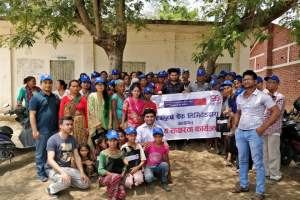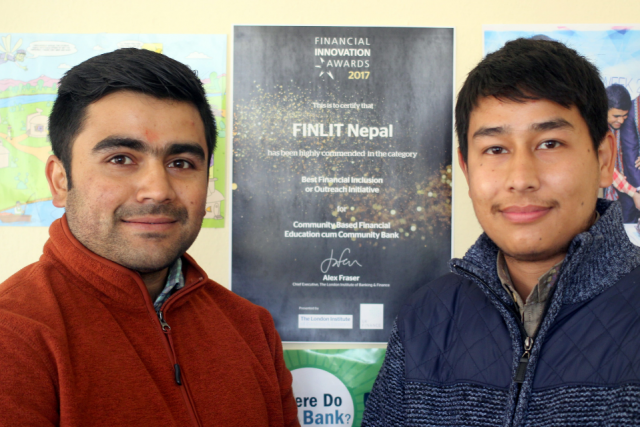Prakash Koirala and Gaurav Thapa came together as business partners. Coming together and putting their minds, they are trying to make a real change in the economy from the grass-root level.
Since 2009, they have been actively providing financial literacy to the people, in turn, contributing to the development of Nepal. Additionally, they are developing comprehensive programs and policies for various financial institutions, banks, government, and non-governmental organizations
1. What social problem are you trying to solve or what social change do you see your product or service bringing in society?
Go to the rural part of Nepal to get an exact idea of the banking sector situation in the country. People aren’t literate and aware of the workings of the banking system. Years ago, when I went to visit a community, I came across people struggling to separate their wants and needs. They lacked the essential money management skills, causing them to constantly experience a dilemma regarding how to use their money.
Even the youth are uninformed about many things related to money management and use of banking services. They cannot write checks or even deposit and withdraw money from banks.
Our aim is to make people literate about their financial responsibilities by teaching them ways to utilize their money to fulfill their needs and wants. We run a free app called ‘Paisa manager’, where people can keep track of their money. With this app, people can track their income and expenses every day with ease, also helping them understand their flow of money.
We are also working for a branchless banking system as a consulting company for the bank as not every person in the country has access to a physical branch. Our help towards this cause is by selecting and training agents to facilitate the desired services towards the demanding people.
In addition to that, we work with private banks, financial institutes and the central bank of Nepal to design and host financial literacy initiatives. One of our aims is also making the government budgets transparent for all the citizen of the country.

2. Tell me how your venture started and the journey behind it? When did it start?
Prakash Koirala: I remember a day in 2009 when I heard some quarreling at home. That day, I gathered a few youngsters I knew and discussed our family problems and the constant quarreling. This is when I understood that economic problems can create social problems which lead to other problems.
I educated a few people coming from a remote place using what I had found on Google and on the basis of my learning and experience. I could see a change in them afterwards. Winning a Global Award at Child and Youth Finance International in 2015, encouraged me to do more. By 2016, me and Gaurav, we both started working in this sector.
Gaurav Thapa: I was quite a notorious kid. I realized responsibility only when I went for studies in India, where I had to handle money and responsibilities alone. I returned to Nepal after finishing my studies and in my hometown, one day I randomly overheard a few strangers discuss economic development and larger societal goals.
Thinking it through a microeconomic view, I realized that a nation’s economic development is brought about by the economic development of the individuals of that country. This understanding led me to join Prakash Koirala in this journey of financial literacy.
3. What is Financial Literacy?
It is a process where we try to engage people in financial services. Financial Literacy is the economic opportunity for all to utilize their financial right, in terms of using bank services and governmental services. Financial literacy is not only about saving money but also about saving money through various ways for e.g. turning the lights and fans when we leave the room.
4. How did you raise funds to start your company? What is your investment to date?
We invested our money in the company. Fortunately, since our inception, we have been connected to different banks so, we never had to worry about the funds.
5. What is the legal status of your company? What stage is the company in now?
We are a private company and it is registered under the private company act in 2016. Although we are a new company, individually we have an experience of about 10 years in this sector. The company is in the scaling upstage. We have already worked in 48 districts with an enormous volume of trained volunteers partnering up with different institutions.

6. What is your current staff strength and how many people did you start with? Who are your target customers?
When we started in 2016, it was only me and then Gaurav Thapa joined me. We have a board of advisors, all 5 of them from different sectors. Now, we have full-time and part-time paid volunteers in all the 43 districts we have visited. Additionally, we have 7 people as full-time staff. Our target customers are banks, financial institutions, micro finances, and cooperatives, international agencies, and the public of rural and urban areas, schools students, migrant communities and workers.
7. What challenges did you face while starting the company and what are the challenges you are facing right now?
Initially, we faced problems in getting people to attend our workshops as they were asking us for allowances to attend workshops. Later we approached the banks in Kathmandu for funds but they did not have any plan for financial literacy. Fortunately, through media support, we were covered in newspapers and online portals that showcased our work and vision. This helped us connect with banks who understood the value of financial literacy.
Another challenge we face is that people do not understand the benefits of being financially literate. Convincing people about being financially literate is difficult and that understanding it leads to a good life.
Giving a one-time workshop is not sufficient as financial literacy deals with changing the behavior and mindset of people. The government should start taking responsibility at the policy level to change the behavior of people in terms of financial literacy. 18-19% of the population is excluded from the banking system in the country and we are trying to bridge this gap by making them banking literate.
8. What are the key needs of your company? HR/ Legal/ Marketing/ Mentorship
To cater to different people, we require the expertise of outreach and a greater strategy to increase the pool of people we engage with. So we are also looking into strategic investment and support.
9. What is the plan with your company?
Our plans are expanding into the FinTech industry. So we are currently working in developing technological tools which will be integrated with artificial intelligence and blockchain technologies. Finally, we also want to scale up towards both rural and urban youths as they are the future of our country and engaging them with the use of technology.
10. Do you measure the impact of your product/service? If not what are your thoughts about impact measurement?
We have a KAP survey method through which we measure how the participants we reached have progressed. We provide one-on-one mentorship to those people that are still hesitant about using banking services. When people say that they are financially independent, we take that as a successful impact. We have expertise in measuring and doing the impact assessment. There are lots of banks in Nepal giving out loans, but there are not any reports on the economic empowerment of the people. So, we are trying to understand what the impact is and how we can measure it.
Interviewed and Article by Priyadarshani Shrestha
Edited by: Yangzum Lama
Originally Published on blincventures.com







